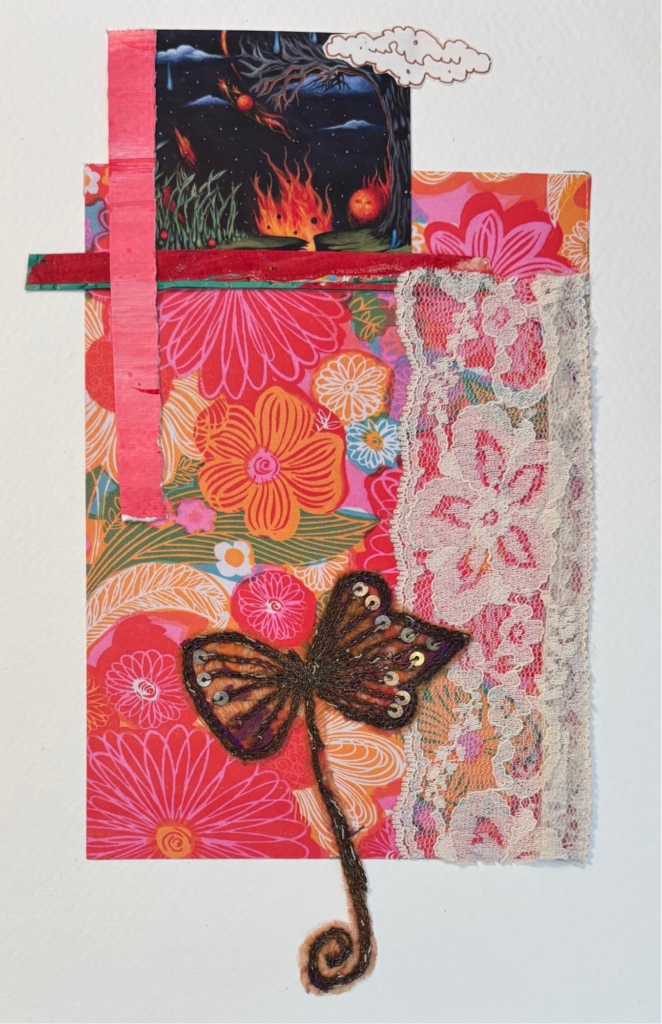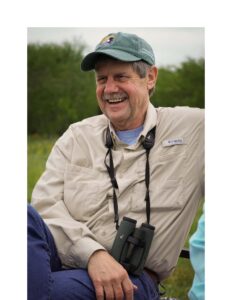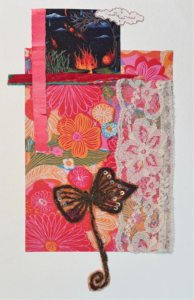
World Environment Day – Q&A With Jim Blackburn, Environmental Attorney, Author and Poet
This question and answer session was inspired by a poem written by Jim Blackburn and released in January, 2025, called “Bring It On,” written in response to Isabelle Scurry Chapman’s collage (shown above)
The poem is provided below to give some context to the discussion.
In honor of World Environment Day, CEC’s Nicole Cloutier-Lemasters had the opportunity to check-in with noted environmental attorney Jim Blackburn. Well known throughout the environmental community, Blackburn is not only noted for his legal work but also his technical expertise and work on nature-based solutions such as the Galveston Bay Park Plan, Texas Coastal Exchange and BCarbon, a non-profit ecosystem services registry. Mr. Blackburn is also well known for his informal email newsletter, sharing his thoughts and perspectives on environmental policy topics as well as inspiring poetry. On the anniversary of upcoming World Environment Day, he shared his thoughts on the current needs and challenges facing Houston’s environmental community. 
- Mr. Blackburn, you occasionally send out dispatches to your followers, fans and colleagues. When you originally sent out this poem in January, it was after the 2024 Presidential Election, with the anticipation of some challenging times ahead. Now that we are a few months in, how has it played out in your opinion?
The Trump Administration has proven every bit as challenging as feared if not more so. The key participants of the Administration arrived in Washington with a plan. They were and remain organized in their agenda. But as I stated when I released the poem “Bring It On”, we live in Texas which is a hard place for standard environmental thinking. I have often said “If it works in Texas, it will work anywhere”. Certainly, those dependent upon the federal government for money will have a hard time. A lot of good work will be stopped, and that is harsh. So there is no doubt about the challenge – it is real. But I also believe that we can find paths for moving forward and ultimately addressing these issues.
- Do you still feel as impassioned about this still being “the time to stand up and fight”?
There has probably never been a more important time for those of us who consider ourselves environmentalists or frankly just citizens of the U.S. to stand up and fight, but we must be smart – smarter than in the past. To my mind, this is a time of change, and we must stand for our principles while being able to rethink and restructure. Fight in this context is much more than simply standing up in the face of power. To fight these days is also to change, and that may actually be the more difficult challenge. One message the election sent is that change is needed and will be required for our goals to be achieved in the future.
- As we near World Environment Day, more than 50 years after its inception by the UN, what are your thoughts on the environmental movement as a whole, at this critical moment?
50 years ago, the environmental movement was just beginning. In the U.S. our rivers were in danger of catching fire, and one did. There was open dumping of hazardous waste. Air pollution was at dangerous levels. There were no brown pelicans in Galveston due to the effects of DDT. There were few bald eagles remaining. And from these and many other starting points, we have made great progress. We have more preserves, with many being run by non-profits that did not exist in 1975. So, from one perspective, there has been amazing success.
But today we are facing new challenges that require major repositioning of environmental thinking to my mind. The challenge today is climate change and its effects. We have no federal statute that directly addresses climate change and are unlikely to see one anytime soon. In my opinion, we must think in economic terms. Climate issues pervade the economy. To address it, we must move to a circular economy – one that is much more in sync with nature. Our current economic structure of “take – make – use – dispose” – the linear economy – is not a 21st century concept and must be replaced. That to me is the grand challenge – developing an economy that is up to the challenges of humans living in the 21st century with the systems that the Earth has evolved that nurture us and keep us alive. And there is both a philosophical and an “act local” side to this challenge.
- How have you seen Houston’s environmental community change over the years? And what would you like to see going forward?
The environmental community of today has become an institution in our community. When I moved to Houston in 1972, there were not many organizations, and the ones that existed were really outdoor organizations – birds and fishing. We now have many groups dedicated to our ecosystems, to specific issues such as air and water, to our bays, to urban agriculture, and to equity. In many respects, the growth of these organizations marks a huge change in the local landscape and an important one.
As to the future, I think we have focused on corporations as the problem, and I suggest we need to rethink that position. From what I have observed over the last ten years or so, the corporate world may be our allies going forward, and government may be the problem. Learning about the supply chain and about working within the market system may be as important or more so than local organizing. We have made hydrocarbons the enemy rather than our economic system more generally. And we are as reluctant to change as is every other long-standing institution.
Ultimately, we must embrace change and make it work for our goals. We can address climate. We can protect biodiversity. We can address environmental inequities. And we can have jobs. But we in the environmental community have some work to do to evolve new programs and new thinking that address today’s issues. That’s what I would like to see – change and new thinking. That is how evolution works.
- As such a leader in this work and someone who has been on the frontlines of many pivotal environmental battles, what keeps you going?
My spiritual connection with the environment keeps me going. I love to go to the marsh in my kayak, paddling up next to a white ibis with her curved bill and watch her probe the marsh mud that is so full of carbon taken from the atmosphere and stored in the soil. I love to walk in my neighborhood, watching the night herons nesting, watching the blue jays chasing the Cooper’s hawk, listening to the red-bellied woodpecker announce its presence. And I love to write about this connection that I have with nature.
I also am sustained by my desire to solve problems and try to protect this wonderful ecological wonderland called the Texas coast. I enjoy searching for innovative alternatives to solve problems, something they don’t teach in law school. I think I have been well served by abandoning a “we versus they” mindset and thinking more holistically about how we are all part of the problem and part of the solution.
I also teach over at Rice University and working with young people also keeps me going. I’m 77 now, and it is so wonderful to see the enthusiasm about these issues in the eyes of a bright 20-year-old. We have wonderful young people in this country and around the world. We just must do our part to help them find a different path than the one shown to us. We can affect the future if we believe we can, and I know they can.
To learn more about Mr. Blackburn and peruse some of his poetry, please visit www.JimBlackburnInfo.com
The Poem That Inspired It All & Accompanying Artwork
Bring It On

Life comes at you hard,
A freeway full of drivers
Hell bent on beating you
Somewhere, anywhere,
Just moving fast as they can,
Moving to get ahead of you.
Life comes at you hard,
The cold front blackening the sky,
The clouds billowing, coming fast,
And then the wind and rain
Hit hard,
Followed by the cold
That sets in behind
And freezes green to brown.
Life comes at you hard,
The flock of robins moving as one,
Coming down to feast upon
The wild berries that are red
Against the green of the leaves
A pack of raiders from the north,
Following the front,
Following life.
Life comes at you hard,
The temperature at night
Staying higher than the average
Of over 100 years of recordkeeping,
Changing the growing season,
Changing life itself
Changing reality for now
And perhaps for all time
Unless we act.
Life comes at you hard,
Causing me to ask
Am I merely an object
Hit by these forces?
Or do I have some say,
Some role, some obligation,
Some ability beyond merely
Taking it?
Can I do more than to simply
Absorb the blow and
Try to keep standing?
From within the chaos of the
Assault,
The color comes through,
The red and yellow of the fire,
The pink and orange beauty
Of the flower and the dragonfly
That stoke the fire within me,
A fire that burns brighter
As the forces manifest themselves,
A fire that refuses to be quenched,
A fire that is life within me
A fire that I have learned
Can grow.
So, bring it on,
Bring on the forces
That help define us,
That help bring meaning
To the truth of
“I am, therefore, I am”,
Bring it on…
So welcome to Earth Church,
Stand up tall in your pew,
Here we greet the headwinds of life,
For they define me and you.